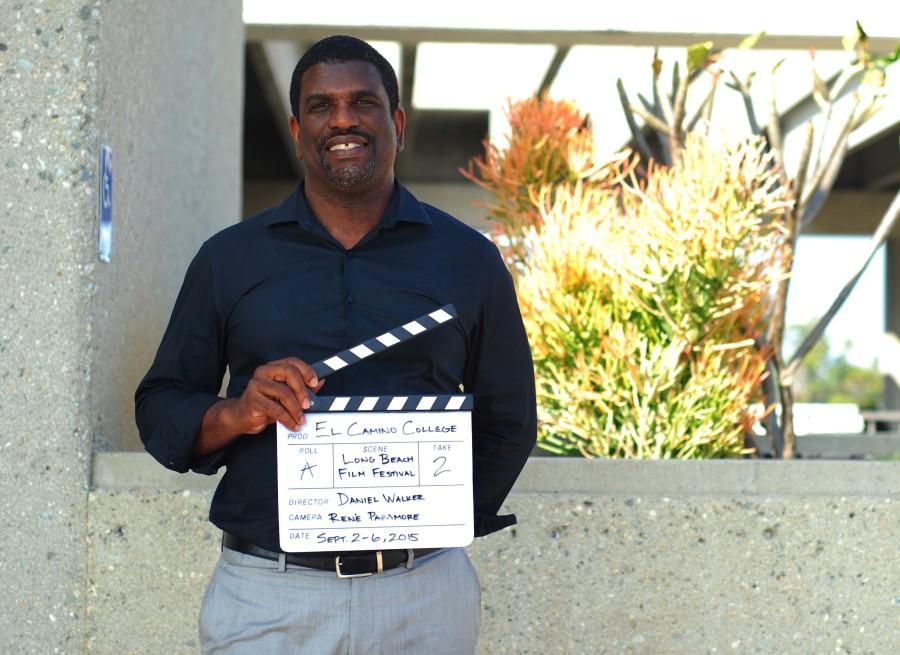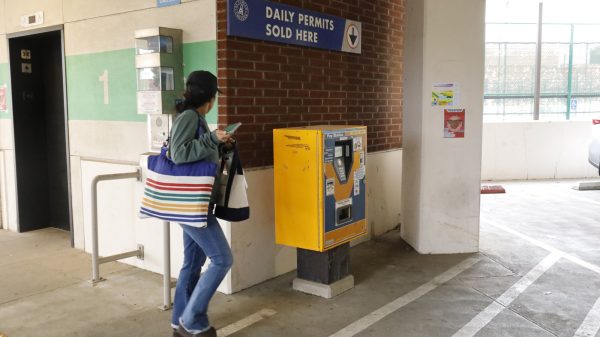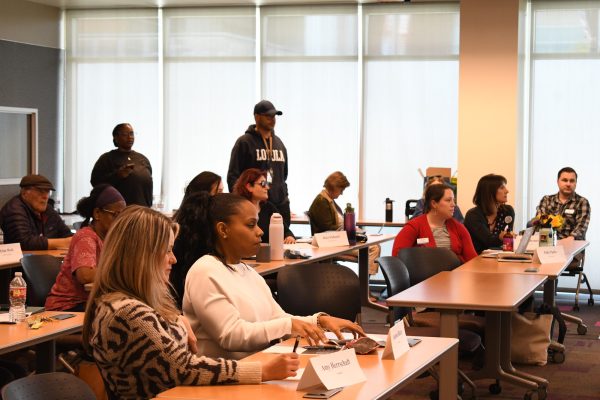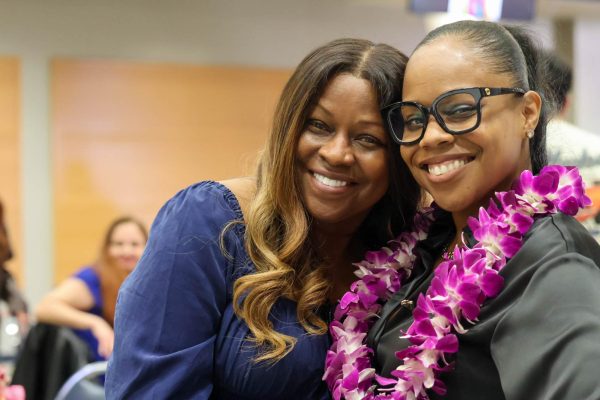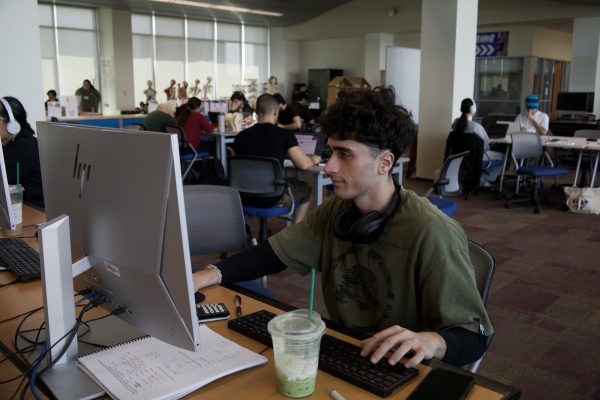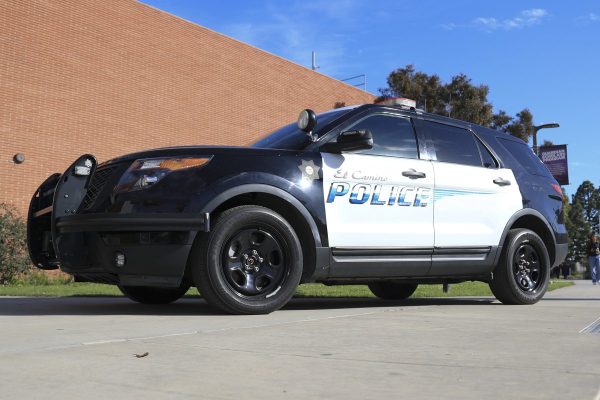EC history professor is the founding director of the Long Beach Independent Film Festival
Daniel Walker, a history professor, is the founding director of the Long Beach Independent Film Festival. Photo credit: Rene Paramore
Update: March 31, 10:15 a.m.
Several minutes after the official time that class is dismissed, not one person is ready to leave. Moments pass before students rise up from their chairs, a few of them walk toward the door, but most of them stay behind, form a line, and wait to talk with their history professor.
After an hour lecture filled with stories told with enthusiasm, it is common for students to either linger or follow Daniel Walker down the hall to his office where they can have a longer conversation with him.
Walker, a history professor, is the founding director of the Long Beach Independent Film Festival.
“I work as a documentary filmmaker,” he said. “I try to tell stories that are true and beautiful. I hope what I do will inspire people and move people to act.”
With an undergraduate degree in psychology and a Ph.D in history, Walker does not have a formal background in art, although he had done creative work and working in creative venues for other people.
“I was being more of a producer, making spaces for others, creating the venue, the space so others could perform, but I wanted to do my own vision,” he said. “I started to tell my own stories. There have been things tied to my life.”
Walker said that he wanted to do documentary filmmaking when he first started his education in history, but there is no training for that in graduate school.
“When you start going to graduate school, no one is trying to teach you to do those things. You’re going to school to become a history professor,” he said.
When Walker started to work with Ken Bernstein, whose work he says is important to him, he wanted to find a way to mesh his love for history and the power of art. He now runs a program at USC called the “Gospel History Music Project.”
He said that they have been going around for 10 years with a film camera and photographers, interviewing and documenting and preserving gospel music so that people can have access to this art form.
“It was working on that project at USC that opened me up because it put me in this world of working with cameras and everything,” he said. “It made me do something that has a story to it.”
Walker said that he started to feel like he could do this kind of work since he was working with camera people, lights, and sound. The other thing, he said, was the change in technology which made the process more reliable and within people’s reach. Walker said that he then felt that he could do an original project which enabled him to tell a story.
“So when I did decide I wanted to do this, I started to make “When Roosters Crow,” he said. “I got lucky that there was all this film available of him (Daniel Scarborough) and the people granted me the access to have it so then I felt an obligation to tell the story.”
“When Roosters Crow” is about professor, dancer and choreographer Scarborough, who later died of AIDS, Walker said.
“He is an amazing human being in addition to being a crazy professor and a teacher of dance that would take regular people with no dance experience necessary, and mold them in one semester,” he said. “Their first time on TV, they won an Emmy.”
Walker said that when he finally reached Scarborough’s age that “put the ultimate fire behind him” to make sure he made the film.
“Even when he died, the way he died was inspiring to folks,” he said. “He told me, ‘You’re going to tell my story,’ and that was like, 25 years ago now,” he said.
When Walker first started in filmmaking, he said he would go to film festivals and found that most film students were younger than him. He realized that a lot of them didn’t know anything about business.
“Because of all of the stuff I’ve done in my life, I understand PR, marketing, how to leverage a brand, how you create your own reality,” he said. “A lot of people thought they had a film and that’s it and they were wondering why they didn’t get to the next level. I didn’t think they had a sense of how to create their own reality or maneuver within a big competitive industry. The teacher in me kicked in.”
Walker explained that the reason why the Long Beach Independent Film Festival has a huge educational component is so that young filmmakers learn how to make things happen.
“We have a college career fair and it also has this film, music and media conference. They need to know more than ‘lights, camera, action,'” Walker said. “I don’t see anyone else as serious about the educational component as what mine has. Mine is about hands on stuff you can learn how to do.”
Hamoun Dolatshahi, 21, communications major, said that when he was a volunteer at the film festival, Walker told him to learn from the experience. Dolatshahi was then presented with the opportunity to host a question and answer session between the director and the audience.
“I was holding up the mic and I was learning what I should and shouldn’t do,” Dolatshahi said. “That was a great experience. He gave me the experience that I needed.”
Dolatshahi said that people came away from the film festival very satisfied. He said it was because of the policy of Walker and that he makes sure people have fun.
“I think what works for him is his energy,” Jarrett Gillett, 31, film major, said. “He’s able to captivate an audience with his energy.”
Walker explained that some things can become very stressful when organizing the film festival and it can feel like sink or swim.
“I had to raise $22,000 in four days,” he said. “If it didn’t happen, it was over. There were days when I am like, ‘Why am I doing this?’”
Walker said that people came away from the Long Beach Independent Film Festival last year saying it was the best film festival they ever went. Film festivals often play on chaos, he said, but his film festival was well organized.
“I think it was the hospitality of the volunteers and the quality of the movies. They were very high quality films,” he said, “Every film played on time, there were no glitches.”
Students at El Camino helped him review films, Walker said. One of the films, “The Dam Keeper,” was played in the classroom and gave their thumbs up to ended up being a film that was nominated for an Academy Award.
“That was cool. That’s the ‘Dam Keeper,’” he said. “It’s about bullying, people making fun of this pig and he decides not to keep the water out. He takes out a certain group of people and then he stops the dam.”
When screening the films, Walker said that he figures out what feels he wants for the festival and then he aims to create a balanced and educational experience.
“My job is to curate the process, so if you’re coming in for five days then, ‘What’s your experience?’” he said. “For me, the big thing about film is film brings people together so I believe that if people come to together and talk to each other, good things happen. My job is to pick the film that creates the conversations.”


